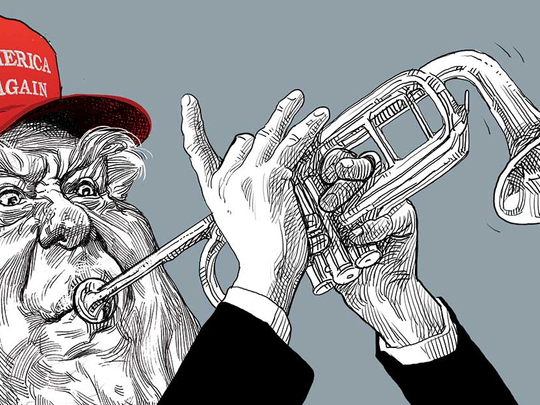
United States President Donald Trump enjoyed a rare satisfaction for a newly-inaugurated president — waving goodbye not just to one vanquished rival, but to three.
His unexpected victory over Democrat candidate Hillary Clinton overcame the 25-year Democratic institution known as Clintonism that dates from her husband’s successful administration in the 1990s. It squashed former president Barack Obama’s attempt to secure his legacy, and his party’s fifth victory in seven elections.
The new chief executive’s unconventional approach to Republican politics could yet create a durable Trumpism that remakes his party, fuelling success beyond his own. But there are early reasons for doubt.
America’s partisan struggle pits historically resonant philosophical traditions against each other. Democrats most vigorously champion social and economic equality, Republicans individual liberty and economic freedom. Presidents who alter the competitive balance modernise their parties for changing demographic, economic and cultural circumstances.
In the late 19th century, the then-president William McKinley helped Republicans retool for the shift from an agricultural to an industrial economy. With outreach to Catholic immigrants and labour, as the modern-day strategist Karl Rove recounts in a recent book, the former Ohio governor cemented a Republican era that lasted, with the exception of former president Woodrow Wilson, until the Great Depression.
In the late 20th century, another former president Ronald Reagan’s message of lower taxes and smaller government realigned ‘Reagan Democrats’ and shattered former president Franklin D. Roosevelt’s New Deal coalition. Later, during his term as president, Bill Clinton offered a “bridge to the 21st century”, tapping a growing bloc of college-educated baby boomers by offering social tolerance, fiscal moderation and a market-oriented approach to Democratic economic objectives.
Obama built on that by harnessing the power of America’s swelling non-white constituency, which has doubled since Clinton’s 1992 breakthrough. Obama’s dominance among younger voters — mirroring that of Reagan and Clinton earlier — alarmed Republicans after his 2012 re-election.
“Young voters are increasingly rolling their eyes at what the party represents and many minorities wrongly think that Republicans do not like them or want them in the country,” read an “autopsy” commissioned by the party’s chairman at the time, Reince Priebus. “It is time to smartly change course, modernise the party and learn once again how to appeal to more people.”
Trump did essentially the opposite. He won by maximising support in decisive states among declining segments of the electorate: Older, rural, white, non-college-educated voters. He fared worst among the young. His call to “Make America Great Again” appealed openly to nostalgia. More vehemently than other Republicans, the billionaire real estate developer vowed to lift prospects for long-suffering working-class voters in an era of rising inequality.
“For too long, a small group in our nation’s capital has reaped the rewards of government while the people have borne the cost,” Trump declared in his Inaugural Address on Friday. “Politicians prospered, but the jobs left and the factories closed.”
In his administration, the new president promised, “Every decision on trade, on taxes, on immigration, on foreign affairs will be made to benefit American workers and American families.”
The possibility of a durable Trumpism lies in deepening the allegiance of those working-class voters while attracting more non-whites in a steadily diversifying electorate. “If he embraces the working class and actually delivers for them, he has potential,” said April Ponnuru, who advocates new Republican approaches at the Conservative Reform Network.
Yet, the new American president’s agenda, like his campaign rhetoric, often looks backward.
He aims to revive a coal industry sagging under the weight of competition from cheap natural gas and environmental concerns. That emphasis risks ceding jobs and market share in the growing renewable energy sector to China.
Trump’s “America first” trade policy bucks the tide of globalisation that has reshaped the world’s economy. His immigration stance jeopardises Republican hopes of adding Latino support and his quest for increased economic growth, since businesses need immigrants to offset dwindling labour supply as baby boomers retire.
Trump has conspicuously pressured companies to shun less expensive labour overseas and invest in America. If successful, he could help temper some harsher features of 21st-century capitalism by altering corporate cost-benefit analyses. But his strategy could also raise consumer prices and inflame conservatives opposed to government coercion and crony capitalism.
It’s unclear how vigorously the new president will confront the “corrupt establishment” he has condemned. Alumni of Goldman Sachs will run his Treasury Department and National Economic Council.
On taxes, he offers Reagan-era prescriptions such as cutting rates on top earners and eliminating estate taxes. Ponnuru, who advocates a “pro-family” approach focused on lower earners, hopes his past campaign rhetoric eventually tugs him and the party in that direction.
Presidents can also modernise their parties through updated campaign techniques. Rove showed how McKinley’s “front porch” campaign exploited the growth of late-19th-century media. Trump has blazed a new trail using Twitter.
But is that digital pulpit a model for other Republicans without his panache? And more important, is reshaping the Republican Party even on Trump’s agenda?
You wouldn’t know it from his past threats to abandon Republicans if treated “unfairly”. “It’s hard to imagine that he cares about modernising his party,” said Stan Greenberg, Clinton’s pollster in 1992. “What he does seem to be doing is dominating his party.”
That’s indisputable. Priebus, the erstwhile Republican chairman, now works for him.
— New York Times News Service
John Harwood is chief Washington correspondent for CNBC.










